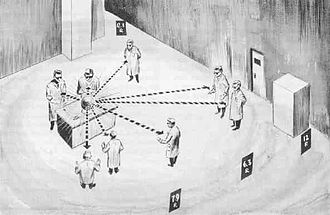List of military nuclear accidents
List of Military Nuclear Accidents
The List of Military Nuclear Accidents comprises a comprehensive chronology of incidents involving nuclear weapons and nuclear reactors within the military sector. These events range from accidental detonations and lost nuclear bombs to reactor meltdowns and radiation exposure incidents. The significance of these accidents lies not only in their immediate impact but also in their long-term implications for nuclear safety, environmental health, and international relations.
Overview
Military nuclear accidents can occur during the design, testing, operation, and disposal phases of nuclear weapons and reactors. These incidents often result from human error, technical failure, or a combination of both. The consequences vary widely, from minimal impact to catastrophic damage, including loss of life, long-term health issues due to radiation exposure, and environmental contamination.
Notable Incidents
1950s
- Castle Bravo Test (1954): The United States conducted a nuclear test at Bikini Atoll in the Marshall Islands, which resulted in a much larger explosion than expected. This caused significant radiation poisoning to the local inhabitants and crew members of a Japanese fishing boat, the Fukuryu Maru, exposing them to high levels of radiation.
1960s
- Palomares Incident (1966): A mid-air collision between a U.S. B-52 bomber and a KC-135 tanker over Palomares, Spain, resulted in the release of four hydrogen bombs. Although none detonated, two of the bombs' conventional explosives went off, dispersing plutonium over the area.
- Thule Accident (1968): A U.S. B-52 bomber carrying four hydrogen bombs crashed near Thule Air Base in Greenland, causing widespread contamination by radioactive materials.
1980s
- 1980 Damascus Titan missile explosion: An explosion in a Titan II missile silo in Damascus, Arkansas, caused by a fuel leak, led to the ejection of a nuclear warhead from the silo.
Prevention and Response
Efforts to prevent military nuclear accidents include stringent safety protocols, regular maintenance and inspection of nuclear arsenals and facilities, and continuous training for personnel. In the aftermath of an accident, response measures may involve evacuation, decontamination, medical treatment for radiation exposure, and environmental remediation.
Impact
The impact of military nuclear accidents extends beyond immediate physical damage, posing significant challenges for public health, environmental protection, and nuclear non-proliferation. These incidents have also influenced public opinion on nuclear weapons and energy, leading to calls for greater transparency, accountability, and disarmament efforts.
See Also
- Nuclear and radiation accidents and incidents
- List of civilian nuclear accidents
- International Nuclear Event Scale
| This article is a stub. You can help WikiMD by registering to expand it. |
Transform your life with W8MD's budget GLP-1 injections from $125.
W8MD offers a medical weight loss program to lose weight in Philadelphia. Our physician-supervised medical weight loss provides:
- Most insurances accepted or discounted self-pay rates. We will obtain insurance prior authorizations if needed.
- Generic GLP1 weight loss injections from $125 for the starting dose.
- Also offer prescription weight loss medications including Phentermine, Qsymia, Diethylpropion, Contrave etc.
NYC weight loss doctor appointments
Start your NYC weight loss journey today at our NYC medical weight loss and Philadelphia medical weight loss clinics.
- Call 718-946-5500 to lose weight in NYC or for medical weight loss in Philadelphia 215-676-2334.
- Tags:NYC medical weight loss, Philadelphia lose weight Zepbound NYC, Budget GLP1 weight loss injections, Wegovy Philadelphia, Wegovy NYC, Philadelphia medical weight loss, Brookly weight loss and Wegovy NYC
|
WikiMD's Wellness Encyclopedia |
| Let Food Be Thy Medicine Medicine Thy Food - Hippocrates |
Medical Disclaimer: WikiMD is not a substitute for professional medical advice. The information on WikiMD is provided as an information resource only, may be incorrect, outdated or misleading, and is not to be used or relied on for any diagnostic or treatment purposes. Please consult your health care provider before making any healthcare decisions or for guidance about a specific medical condition. WikiMD expressly disclaims responsibility, and shall have no liability, for any damages, loss, injury, or liability whatsoever suffered as a result of your reliance on the information contained in this site. By visiting this site you agree to the foregoing terms and conditions, which may from time to time be changed or supplemented by WikiMD. If you do not agree to the foregoing terms and conditions, you should not enter or use this site. See full disclaimer.
Credits:Most images are courtesy of Wikimedia commons, and templates, categories Wikipedia, licensed under CC BY SA or similar.
Contributors: Prab R. Tumpati, MD

